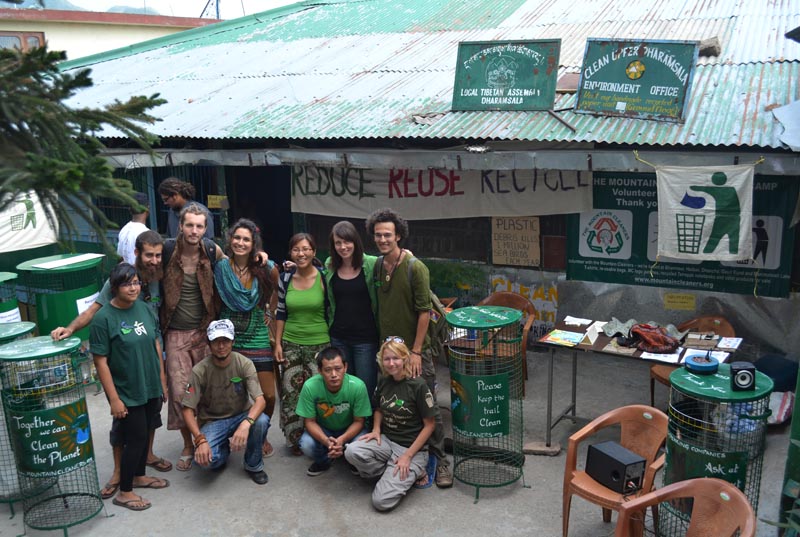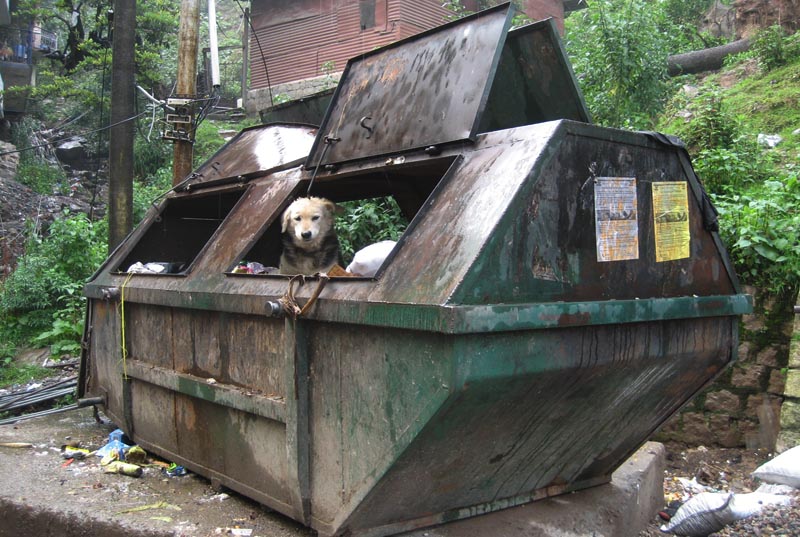 This is the third and final article in a series called Cleaning Up Dharamshala - When Garbage Builds Bridges. In the spirit of World Environment Day on June 5, The Tibet Post International explores the pioneering waste management projects taking place in His Holiness the Dalai Lama's town of residence, McLeod Ganj. For a more detailed introduction, see Cleaning Up Dharamshala - When Garbage Builds Bridges. To read the first part, click here. To read the second part, click here.
This is the third and final article in a series called Cleaning Up Dharamshala - When Garbage Builds Bridges. In the spirit of World Environment Day on June 5, The Tibet Post International explores the pioneering waste management projects taking place in His Holiness the Dalai Lama's town of residence, McLeod Ganj. For a more detailed introduction, see Cleaning Up Dharamshala - When Garbage Builds Bridges. To read the first part, click here. To read the second part, click here.
Dharamshala: I am in the middle of an interview with Jodie Underhill, from the Mountain Cleaners, in a café in Dharamshala's satellite town, Bhagsu, where changes are happening on the garbage-scene.
Jodie has been explaining to me how she founded the Mountain Cleaners and how they run their weekly clean-up trips on the surrounding trekking paths and about their community education events.
The impressive results of the Mountain Cleaner's work has caught my inner sceptic off-guard, but I still have a few critical questions left:
I wonder what she will say about the miserable condition of the local dump site? And is it really so easy to get people from different cultures to work together?
Not an Ideal Situation
Over the past decade, the estimated amount of waste in McLeod Ganj, and surrounding areas, has doubled to an annual 650 tonnes. Approximately half of that is being recycled or composted by the CUDP and the Mountain Cleaners, leaving the ill-equipped local dump site as the only option for the remaining 325 tonnes of waste.
In the world of waste management there are several ways to go about garbage-dumping. One of the better options is to establish a so-called land-fill, where the waste is typically compacted and sealed into the ground. This is not the case for the Dharamshala dump site. Here, the garbage is left on the naked ground until, presumably, it is piled up too high and another site must be found.
Jodie agrees, "it's not an ideal situation at all, but at least it's all being kept in one place rather than being left absolutely everywhere."
Rolling Around in Money
Even though Himachal Pradesh, where McLeod Ganj is located, was the first Indian state to pass an act on waste management, there still seems to be ample room for improvement. I ask the dedicated Garbage Girl, as she is fondly called, what she would wish for if she could pass a new state-law. Her answer falls immediately, "that waste segregation was compulsive, without a doubt!"
The reality is that there are no recycling stations in all of Himachal Pradesh and illegal dump-sites are a common sight. "If they were giving out fines for littering and dumping they'd be rolling around in money", Jodie comments dryly.
Engaging the Refugees
Just then, Thinley Namgyal, the Mountain Cleaners' Tibetan employee, enters the cafe with a big smile in the midst of a pre-monsoon rain-fall. His long hair is dripping and he removes his glasses to wipe off the water. He has been a Mountain Cleaner for little more than 6 weeks but his enthusiasm is tangible.
32-year-old Thinley is a trained teacher and talks of the value of education. "If tibetans had good facilities and more knowledge, then there could be no more pollution, but the chinese occupying Tibet are building factories and making businesses and making pollution and producing garbage", he says.
"Because my family sent us to school we know about garbage at home and so on, but we don't segregate", Thinley continues as Jodie and I listen attentively, "some Chinese collect plastic and paper. Me and my brother sold our used school-papers to them for a little money."
One of Thinley's most important tasks as a Mountain Cleaner is to recruit Tibetan volunteers. Until recently, hardly any of their environment education material has been in Tibetan, and for most of the Tibetan refugees, eking out a living often leaves little time for volunteering.
"When my friends ask me what I do, I make a point of explaining that we need more volunteers, every day I talk about this", says Thinley and adds a little impatiently, "I don't know why they haven't come yet, i am trying all I can."
A Dirty Profession
Recruiting Indian volunteers, on the other hand, is a little easier, but local Mountain Cleaner Manu, who is from the Gaddai tribes of Himachal Pradesh' mountains, is facing other cultural obstacles.
Working with garbage is not exactly considered a high status profession in India: "My family is from a high caste, but I want to change things", Manu told me on World Environment Day, "sometimes people ask me; what are you doing, you are well educated?"
But Manu doesn't care much about prejudice, as he said with a smile and a shoulder-shrug, "it's no problem, education can be a help for anything, it creates awareness."
Another issue is the unfamiliarity with non-recyclable waste. Manu told me that, "15 years ago we did not have disposable plastic cups, chips-packets, biscuit packets and so on. Everything has changed very quickly in India".
Although there are some bins in McLeod Ganj, it is not nearly enough to meet the need. Obviously used to the question, Tenzin Choedon from the CUDP had readily given me several reasons for the lack of bins:
"Coming up with a plan of putting up bins is easy, but maintaining the bin, which someone has to do, keeping it safe from animals and looking after it so it doesn't become an illegal dump site again, is a different story."
With no jurisdiction, the CUDP must apply to the municipal council before putting up bins. So far there has been little progress. Much too narrow streets, animal raids and people setting fire to the bins have been among the council's arguments, but also theft of bins is a problem.
"Even today we had news that a bin near Dal Lake was missing a lid because somebody ripped it of", Choedon told me. The high price of scrap iron is tempting to some and without lids, the bins and containers are like an open invitation for hungry animals and provide an easy fireplace for homeless people to warm themselves by in the winter.
No Time to Waste
Jodie is about to take another bite of her lunch when I ask her my ultimate question, with a lead-up of hard facts and indignation; "where are the bins in this place?" Her whole face lights up as she drops the fork to the plate. To my great confusion she replies, "we've just had some beautiful dustbins made! I can't wait, you really got to see them, they are like works of art!"
In 2010 Jodie was awarded the "Green Hero" award for, as she puts it herself, "trying to find solutions for pressing social problems and finding methods without waiting for the government to do something."
In upper Bhagsu, the Mountain Cleaners have thus begun to implement their ideas with public bins and composting sites. Another project underway is the "Green Book" which will feature environmental friendly local businesses and a guide to safe waste management.
In time, Jodie hopes to influence local authorities by showing viable alternatives. Perhaps it won't be long after all, before street bins are a given in Dharamshala.
Our Mess, Their Job
Speaking of the Mountain Cleaners' good results with educating the local children, Jodie leaves me hanging on a hopeful note:
"They have come along, the penny has dropped for them and they understand it" she says. As for the adults, Jodie says, "I see all these people bringing their waste down, that never used to happen, there'd be fires burning every where, I don't see that anymore."
"Garbage Girl" is by now a known face in the area, and people are appreciating her work; "a lot of people speak to me and say, I always dropped the garbage, I never ever thought about it all my life, and now after seing you guys, I don't do that anymore" she says and adds, "I see a lot of positivity in this area."
She concludes the interview with an instruction: "The children are the next generation and they are the ones who are going to fix this mess that we've made, and it is our job to give them the tools they need to be able to do that."
The Need to Know
While garbage persists to pose a threat to our health and the natural environment, proper waste management is as adamant as ever. Useful legislation is, however slowly, being passed, and new ways to recycle waste are continuously being invented.
The, universally used, Tetra-Pak cartons can now be turned into colorful construction sheets and plastic-bottles are being used as building materials and made into T-shirts. With new markets opening, even money can be made from garbage.
But for all the progress made, one factor stands above the rest: Education. To create and sustain change, a heightened awareness is crucial, and education is key to that.
On World Environment Day, June 5, after explaining in great detail the particulars of the Mountain Cleaners' work, Manu from the Mountain Cleaners told me, "before getting this job, I had no idea about waste management, I just learned everything from here."
My surprise must have read clearly in my face because he nodded reassuringly and added in conclusion, "we can change the garbage situation for sure. Day by day, year by year, it is improving."


![Tibet has a rich history as a sovereign nation until the 1950s when it was invaded by China. [Photo: File]](/images/stories/Pics-2024/March/Tibet-Nation-1940s.jpg#joomlaImage://local-images/stories/Pics-2024/March/Tibet-Nation-1940s.jpg?width=1489&height=878)
















